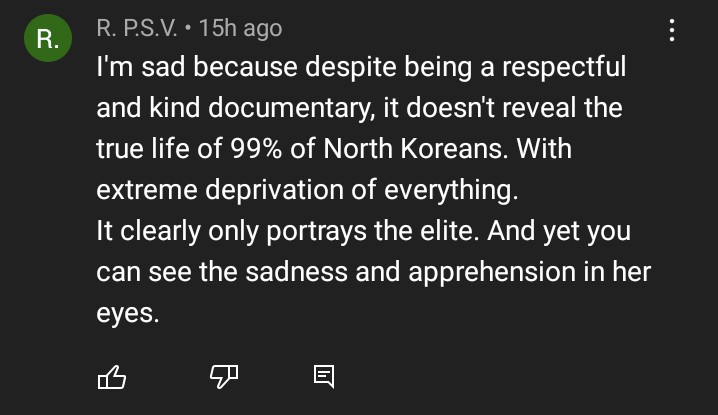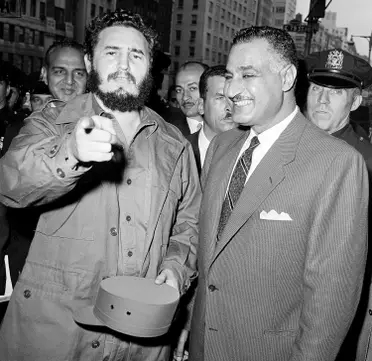
I haven’t watched this particular doc, but one big thing that always gets left out when folks want to talk about how “bad things are for the people from lack of stuff (doesn’t matter what)” is sanctions. We see so much coverage about how people can’t get things they need/want and how “poor” the average person is. But just like with Cuba, the people in DPRK could have access to stuff if nations like the US were to just stop making it a problem in the first place. If the US really gave any fucks about even just peaceful competition in order to see which systems are actually good and help the most people. Then it would stop going out of its way to make sure the most people suffer. Creating situations where other nations have to pick between normalizing trade with DPRK/Cuba, or be “allowed” to keep trading with the US is beyond fucked up.
The US always points to how DPRK/Cuba are “authoritarian military isolated nations” (China also gets this just the isolation bit is more about hiding things). But given how the US literally polices the world with its military everywhere, it means there is a literal and constant threat of war/invasion/destabilization/coups that require constant readiness. It is seen as “just protecting the peace/freedom” when the US places bases/missiles all the way up the the borders of any other nation (but especially Cuba/DPRK/China/Russia (even though Russia isn’t socialist). But anything slightly close to this, or figuring out how to make long range missiles from these nations is somehow “acts of aggression that MUST BE STOPPED”. Shit isn’t paranoia if there is one big motherfucker constantly fucking with you.
I would love to see what a difference it would make to see the DPRK/Cuba be able to relax and not be forced into externally created isolation. To see what is possible if they have real access to supplies and to trade and free up money that currently has to go into defense (would also love to see the same freeing of money from the US military industrial complex). Allow people to easily travel into and out of these nations. It is super super easy to just make up all kinds of shit if more people can’t go and see for themselves. Even western media would have a hard time just publishing most of the shit without real push-back. They currently just go with whatever wild shit they hear about these nations. But will actually defend “important” allies of the US that are very much known and proven to be active oppressors of their own people (Saudi Arabia and Israel being two big ones, but also the right-wing death squad leaders in all of Central and South America).
I would love to be able to not be immediately called a crazy person for even mildly expressing that maybe these places aren’t really as “evil” as we have been indoctrinated to believe without question. I can say nice things about Cuba more these days, but DPRK is an instant conversation ender. And it is all because there is just so much disinformation from all media which can include stuff from DPRK. It is hard to be open if there are things that aren’t going well if you know that any admittance of slight failure will get ran through the shit by the US as to “how bad things really are” or used as absolute cannon fodder for trying to create a “valid” reason for trying to spark another colour revolution. The US does this same thing with its own failures if it might be open season for our enemies to drag us with.
It is just easier to be open to others and to take constructive criticism when everything isn’t done in bad faith or used to attack. Just like with kids, they will open up and own up to stuff if they don’t feel like they will just be screamed at and spanked for even admitting to something. Shit doesn’t have to be this hard, but no sitting or aspiring US politician or media outlet will go anywhere near being seen as “working with DPRK” in any capacity other than aggressive/demanding until the masses demand them to change course finally.
This is a great description of the colossal amount of propaganda wielded against these countries, DPRK in particular. I think fact-checking information about DPRK is particularly difficult for Westerners to do not only because of the factors you listed but also because of a high language barrier, by which I mean that Korean language proficiency is relatively uncommon outside of Korea–contrast that with a more numerous and widely distributed community of Spanish, Chinese, or Russian speakers, which increases the chances of independent fact-checking being conducted by diverse parties. Add to that South Korea’s importance as a U.S. stronghold, and the various other pressures that you listed about DPRK and why they would be reluctant to release information that could leave them open to criticism, and the West basically has a license to say whatever they want about North Korea with zero voices to the contrary. If someone suggests that Western narratives on DPRK might be inaccurate or distorted, it somehow seems to equal to endorsing every single thing that has ever happened in North Korea, real or imagined.
In relation to this I want to share a couple of Parenti quotes about propagandistic media:
Long after the specifics of a case are forgotten, or never learned, long after the case itself has been discarded by the cold war propagandists or demolished by opponents, there remains a residue of negative feeling and visceral impact that makes the next mobilization of bias that much more plausible sounding. As in any effective propaganda campaign, the appeal is to well-established emotive impressions and conditioned responses rather than to specific facts and actualities.
Here he is talking about incomplete/distorted media reports around the incident of flight KAL 007, which he makes a case for as being a U.S. spy operation, but was reported as the Soviets brutally shooting down a passenger plane unprovoked. Parenti points out that in the case of the KAL plane, one opinion poll showed that “a majority of Americans thought the government had not told the whole story about the KAL tragedy” and he notes that this reveals the limits of propaganda. However, Parenti adds, "the fact that most Americans did not unquestioningly swallow the whole story does not mean they were unaffected by it and by the daily ideological pounding of which it was a part. Not everybody bought the story, but millions did, and few could offer a coherent refutation–given what was provided by the news media." (This is from “Inventing Reality”)
This tactic is not unique to that event, or to the treatment of DPRK either, but I think DPRK is particularly vulnerable to this tactic being used against it and it’s sickening how much harm can be done to a country through this cycle that leads to ever-increasing isolation and deprivation, which then becomes the basis for further lies and distortions to further isolate and deprivate. And again, it’s wild how just pointing this out is somehow interpreted by many people as unequivocal support for every policy or action ever taken by North Korea.
I get so exhausted every time I see a comment that says “I can see the fear in her eyes” “they look happy but their eyes tell a different story” “they were all executed after this” etc.
Here’s a student at a university in DPRK being interviewed, judge for yourself what her emotional state seems like: https://www.youtube.com/watch?v=bSrzIOPFN5Y
I would say this student smiles, talks calmly, and explains her educational experiences, etc. Might be slightly nervous due to being on camera and speaking a foreign language, but simultaneously seems happy to be interviewed and does not seem to be in distress. That’s just my own opinion, and I wouldn’t be scrutinizing this person so intently if not for the many comments I always see on videos about DPRK that always insist on the “eyes” of people being full of fear/sadness/pain, and all smiles being “fake”, when I suspect that if they saw the same video without the context of DPRK they wouldn’t be making comments like that.
Comments:
I think here eyes are telling a different story.
I feel so sad
her English is great, she seems so intelligent and interesting. too bad she lives in the worst place imaginable and her talents will probably be wasted thanks to her evil government.
I can feel her fear
Scroll down on any neutral or positive footage of North Korea and you will see 100 variations of this kind of comment (as well as a lot of objectification of North Korean women).
Please explain how you know what the “true life of 99% of North Koreans” is. I will eat one of my rancid socks if this person has ever even visited the DPRK, let alone lived there
Youtube comments always coping





